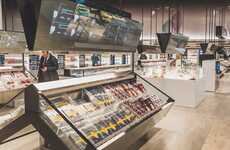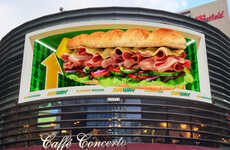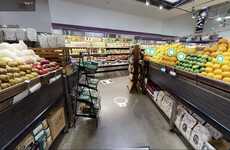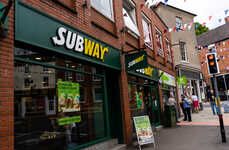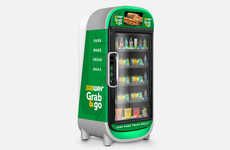
Homeplus Uses Clever Marketing Campaign to Become Number One
Kevin Young — June 25, 2012 — Lifestyle
While most businesses sell their products in grocery stores, Homeplus decides to sell theirs in a virtual subway supermarket.
Homeplus is Korea's second largest home goods store chain next to E-Mart, which leads in first place with more stores. To increase the amount of traffic to its stores, Homeplus decided to create a virtual store in the subway so people can easily shop without the need to travel to a store. Subway riders purchased goods by scanning the QR code, which automatically stores every item into the cart.
The selected goods are then packed and delivered right to the buyer's doorsteps. As a result of this clever marketing technique, Homeplus became number one in the online market and if it keeps up the good job, they'll eventually become number one overall.
Homeplus is Korea's second largest home goods store chain next to E-Mart, which leads in first place with more stores. To increase the amount of traffic to its stores, Homeplus decided to create a virtual store in the subway so people can easily shop without the need to travel to a store. Subway riders purchased goods by scanning the QR code, which automatically stores every item into the cart.
The selected goods are then packed and delivered right to the buyer's doorsteps. As a result of this clever marketing technique, Homeplus became number one in the online market and if it keeps up the good job, they'll eventually become number one overall.
Trend Themes
1. Virtual Subway Supermarkets - The concept of virtual supermarkets in subway stations presents a disruptive innovation opportunity for retailers to reach consumers in high-traffic areas.
2. QR Code Shopping - Using QR codes to enable seamless shopping experiences in virtual subway supermarkets opens up opportunities for retailers to enhance convenience and boost sales.
3. Online Grocery Shopping - The success of Homeplus' virtual subway supermarket highlights the growing trend of online grocery shopping and the potential for retailers to tap into this market.
Industry Implications
1. Retail - The retail industry can leverage virtual subway supermarkets to drive sales and attract customers in urban areas.
2. Marketing - Innovative marketing campaigns like virtual subway supermarkets offer disruptive opportunities for marketers to engage with consumers and drive brand awareness.
3. E-commerce - The rise of virtual supermarket experiences and QR code shopping reflects the growing role of e-commerce in the grocery industry, opening up opportunities for online retailers.
4.6
Score
Popularity
Activity
Freshness


